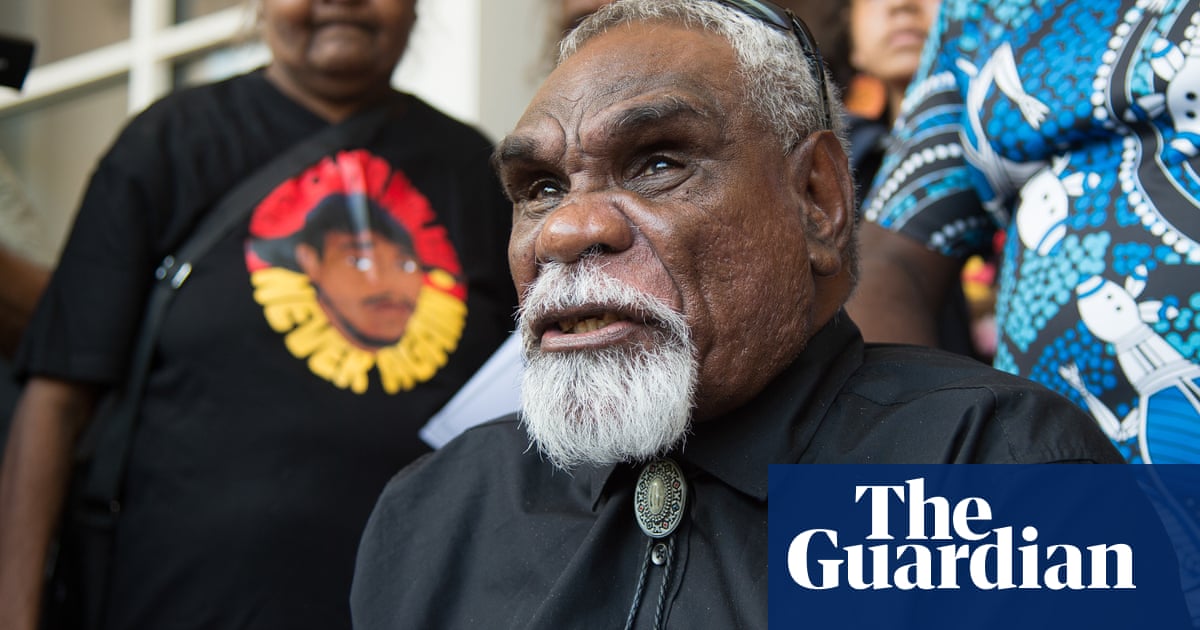An independent investigator must be appointed to examine the death of a Warlpiri man in police custody, family members say, while also demanding video footage be released.
The 24-year-old man with disabilities from Yuendemu died on Tuesday afternoon after police restrained him in an Alice Springs supermarket.
His family wants Northern Territory police to “immediately cease making public statements or media briefings that speculate on the cause of death or denigrate the character of the deceased”.
They have also asked the force to retract any statements already made “where they suggest criminality or aggression on the part of the deceased in the absence of any finding by a court or coroner or other independent investigation”.
Solicitor George Newhouse has written to the police’s acting commissioner Martin Dole on behalf of Warlpiri elder Ned Jampijinpa Hargraves, who is the 24-year-old’s grandfather.
The family stated that NT police should “appoint an independent body from another state or territory to undertake … investigations in a culturally safe manner”.
The letter said police should also immediately provide “all relevant CCTV and body-worn camera footage involving the deceased prior to and during his time in custody”.
NT police on Friday rejected the call for an independent investigation.
“I respectfully reject calls for the investigation to be handed to an external body,”Dole said in a statement.
“This incident is being investigated by our major crime division, which operates under strict protocols and with full transparency. The investigation will also be independently reviewed by the NT coroner.”
NT police did not respond on Friday to calls for footage to be released.
Hargraves and others met at the Coles supermarket on Friday to remember Kumanjayi – a substitute name for someone who has died – and to demand justice.
“I am devastated by the death of my Jaja [grandson], another Warlpiri man who has had his life taken at the hands of the NT police,” Hargraves said.
The man’s death came days before coronial inquest findings were due after the 2019 death of Kumanjayi Walker, who wasshot and killedby police officer Zachary Rolfe.
The findings, due to be released on 10 June, could be delayed because of this week’s death.
Police said there was a confrontation between the 24-year-old and a security guard about 1.10pm in the Alice Springs supermarket. The man had been “placing items down the front of his clothing”, police alleged.
The NT police assistant commissioner Travis Wurst said on Tuesday the man “behaved rather aggressively and was placed on to the ground” by police officers. “He was later identified as losing consciousness,” Wurst said.
The man stopped breathing and was given CPR before being taken to Alice Springs hospital. He was pronounced dead about 2.20pm.
TheIndigenous Australiansminister, Malarndirri McCarthy, said on Friday that an independent investigation “may be warranted”.
“It may be important to do that,” she told ABC radio. McCarthy said on Thursday that misinformation and rumours “often abound in these circumstances” and that compounded grief and anger for families.
Sign up toMorning Mail
Our Australian morning briefing breaks down the key stories of the day, telling you what’s happening and why it matters
after newsletter promotion
Anthony Beven, from the North Australian Aboriginal Justice Agency (NAAJA), supported the camera footage being released to stop “rumours and innuendo”.
“The footage will be disclosed at the coronial inquiry but, as Mr Hargraves and the family were saying, the longer it goes without people seeing that footage, the more thoughts are going through people’s minds as to what happened or didn’t happen,” he said.
“For the sake of transparency and alleviating any concerns the family has around what occurred, NAAJA fully supports the CCTV and body cam footage being released publicly – and if not to the public, at least to the family.”
The justice agency chair, Theresa Roe, said she supported the work police officers did but “we need to stop locking up Aboriginal people in record numbers”.
“It isn’t the answer,” she said. “Crime isn’t decreasing. Instead of building new prisons, let’s find out why a young person had to resort to [allegedly] shoplifting and what could have been done to prevent this tragic event.”
There have beennine Indigenous deaths in custodythis year.
On Friday, the former Labor senator and Yawuru elder Pat Dodson said he was “dismayed and saddened” by the Alice Springs death.
“When you have authority, particularly police and prison officers … that can take the freedom away from another citizen or another human being, you’ve got to exercise that with the utmost diligence,” he told ABC radio.
Dodson emphasised the need for transparency. He said people needed “data as to what happened at that moment when that person was being arrested and taken into custody”.
Newhouse wrote that police commentary risked undermining the investigation and “prejudicing public understanding and [causing] significant and unnecessary distress to the family”.
“Furthermore, where the agency commenting is the very institution whose actions are under scrutiny and who are investigating themselves, such statements raise legitimate concerns about institutional bias and lack of procedural fairness.”
A spokesperson for Coles said the supermarket giant was assisting police with their inquiries and the store was closed on Friday out of respect for the man’s family.
“We are deeply saddened by this tragic incident,” the spokesperson said. “Our thoughts go out to the man’s family, loved ones and the wider community during this difficult time.”
Indigenous Australians can call13YARNon 13 92 76 for information and crisis support; or call Lifeline on 13 11 14, Mensline on 1300 789 978 or Beyond Blue on 1300 22 4636
